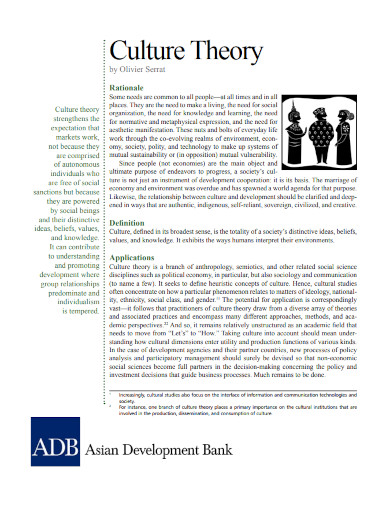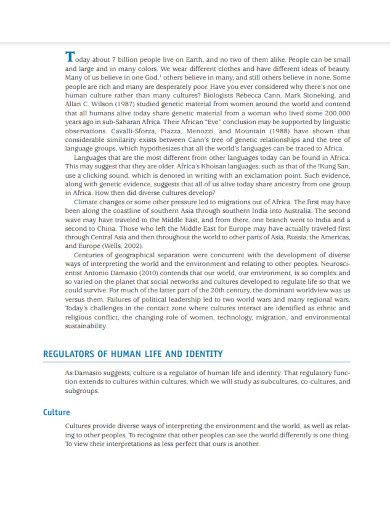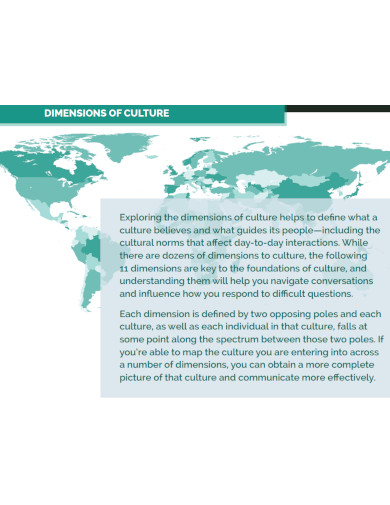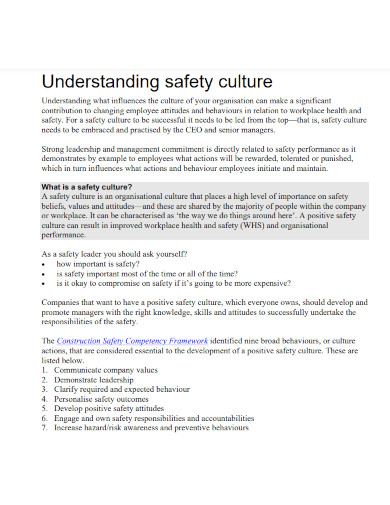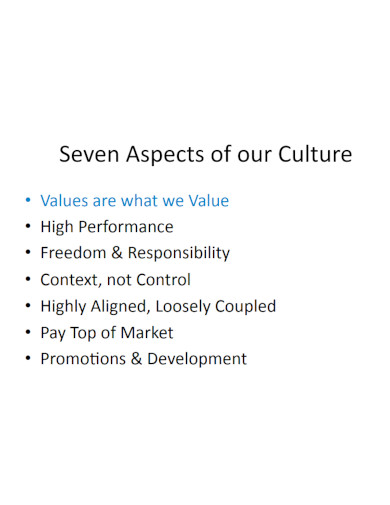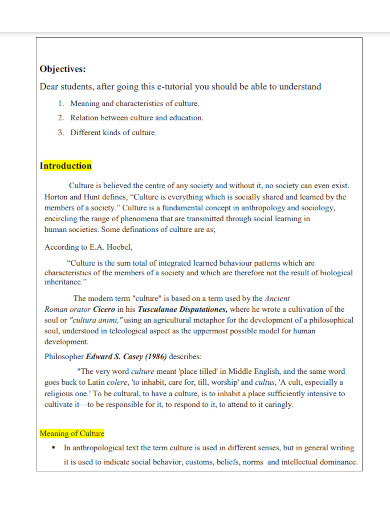100+ Culture Examples Examples
Culture encompasses the beliefs, practices, arts, and values of a society, shaping its identity and way of life. It influences how people communicate, interact, and perceive the world around them. Through cultural expressions such as language, music, art, and traditions, individuals connect with their heritage and create a sense of community. By exploring culture, we gain insight into the diverse ways societies evolve, adapt, and thrive. This article delves into the essence of culture, examining its impact on personal and collective experiences, and highlighting its role in fostering understanding and unity among people.
What Is Culture?
Culture has many definitions that either denote the human race’s collective efforts in arts and media or the social activities, social norms, biases, and traditions a specific social group integrates into their daily lives. There are many subtypes of culture one can observe in our everyday lives such as pop culture, organizational or corporate culture, and social culture.
Definition
Culture is the collection of beliefs, customs, arts, social institutions, and achievements of a particular nation, people, or social group. It encompasses the ways in which people live, express themselves, and organize their societies. Culture includes language, religion, cuisine, social habits, music, arts, and norms that define the behaviors and practices of a group. It shapes individual identities and influences how communities interact with each other and the environment around them.
Culture Examples
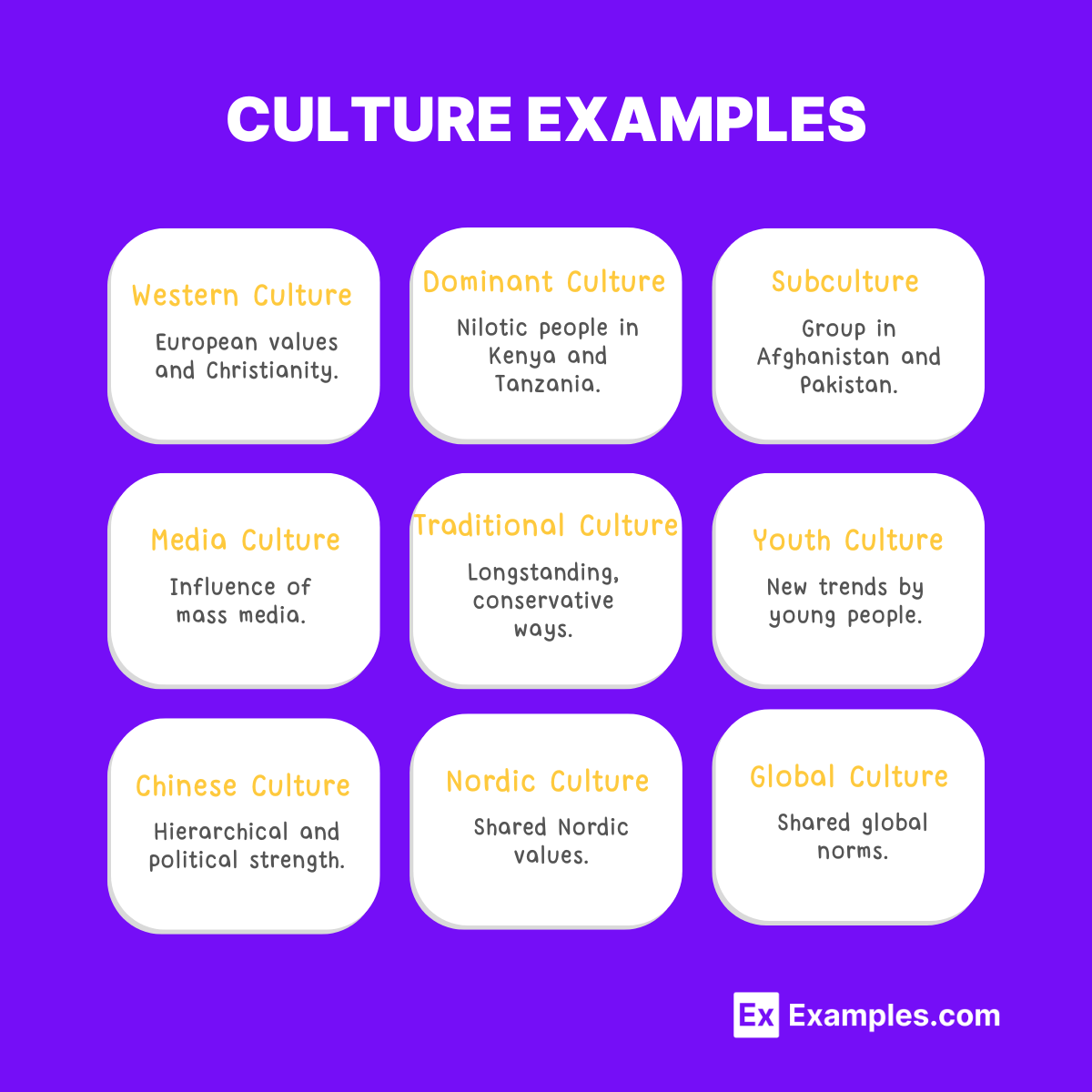
- American Culture: Known for its emphasis on individualism, fast food, and popular media.
- Chinese Culture: Rich in history with traditions like Confucianism, tea ceremonies, and festivals like Chinese New Year.
- Indian Culture: Known for its diverse languages, religions, cuisine, and festivals like Diwali and Holi.
- Japanese Culture: Features unique customs like tea ceremonies, sushi cuisine, and traditions such as ikebana and sumo wrestling.
- French Culture: Celebrated for its cuisine, fashion, art, and landmarks like the Eiffel Tower.
- Mexican Culture: Known for its vibrant festivals like Dia de los Muertos, cuisine, and music such as mariachi.
- Brazilian Culture: Famous for its Carnival, samba music, and the diverse Amazonian traditions.
- Egyptian Culture: Rich in ancient history with pyramids, hieroglyphs, and festivals like Sham El-Nessim.
- Russian Culture: Known for its literature, ballet, traditional music, and Orthodox Christianity.
- Greek Culture: Celebrated for its ancient history, philosophy, mythology, and cuisine.
- Italian Culture: Famous for its art, Renaissance history, cuisine like pasta and pizza, and festivals.
- Spanish Culture: Known for its flamenco music and dance, bullfighting, and festivals like La Tomatina.
- Turkish Culture: Features traditions like Turkish tea, kebabs, and the Whirling Dervishes.
- Nigerian Culture: Rich in tribal traditions, Nollywood films, and music genres like Afrobeats.
- Ethiopian Culture: Known for its ancient history, coffee ceremonies, and religious festivals like Timkat.
- South Korean Culture: Famous for K-pop, kimchi, and the cultural phenomenon of Hallyu (Korean Wave).
- German Culture: Known for its history, beer, festivals like Oktoberfest, and classical music.
- British Culture: Rich in history, literature, the monarchy, and traditions like afternoon tea.
- Vietnamese Culture: Known for its cuisine, traditional dress (ao dai), and festivals like Tet.
- Thai Culture: Famous for its cuisine, Buddhist temples, and festivals like Songkran.
- Moroccan Culture: Rich in history, known for its cuisine, traditional music, and architecture.
- Australian Culture: Known for its indigenous heritage, sports, and laid-back lifestyle.
- Peruvian Culture: Famous for its ancient Incan history, cuisine, and festivals like Inti Raymi.
- Iranian Culture: Known for its Persian history, poetry, and festivals like Nowruz.
- South African Culture: Diverse with influences from various ethnic groups, known for its music and dance.
- Indonesian Culture: Known for its diverse islands, traditional dances, and batik textiles.
- Pakistani Culture: Rich in traditions, cuisine, and festivals like Eid.
- Saudi Arabian Culture: Known for its Islamic traditions, cuisine, and festivals.
- Argentinian Culture: Famous for tango, cuisine like asado, and literature.
- Polish Culture: Known for its history, cuisine, and festivals like Easter Monday (Śmigus-Dyngus).
- Kenyan Culture: Rich in tribal traditions, music, and wildlife conservation.
- Filipino Culture: Known for its hospitality, festivals like Sinulog, and cuisine.
- Cuban Culture: Famous for its music, dance like salsa, and history.
- Icelandic Culture: Known for its Viking history, literature, and unique landscapes.
- Swiss Culture: Famous for its neutrality, cheese, chocolate, and watches.
- Swedish Culture: Known for its traditions like Midsummer, design, and cuisine.
- Norwegian Culture: Rich in Viking history, natural beauty, and traditions like skiing.
- Dutch Culture: Known for its art, windmills, tulips, and festivals like King’s Day.
- Jamaican Culture: Famous for reggae music, cuisine, and festivals.
- Nepalese Culture: Known for its Hindu and Buddhist traditions, festivals, and Mount Everest.
- Sri Lankan Culture: Rich in history, known for its cuisine, tea, and festivals like Vesak.
- Colombian Culture: Known for its music genres like cumbia, festivals, and cuisine.
- Hungarian Culture: Famous for its cuisine, folk music, and history.
- Tibetan Culture: Known for its Buddhist traditions, festivals, and art.
- Ghanaian Culture: Rich in tribal traditions, music, and festivals.
- Chilean Culture: Known for its literature, cuisine, and festivals.
- Ukrainian Culture: Rich in history, known for its folk music, cuisine, and traditions.
- Romanian Culture: Famous for its folklore, history, and festivals.
- New Zealand Culture: Known for its Maori heritage, natural beauty, and rugby.
- Finnish Culture: Famous for its education system, sauna traditions, and design.
For Students
- Study Groups: Collaborating with peers for exam preparation.
- School Uniforms: Wearing standardized clothing to promote equality.
- Classroom Etiquette: Respecting teachers and classmates.
- Extracurricular Activities: Participating in sports, music, or clubs.
- School Assemblies: Gathering for announcements and performances.
- Honor Codes: Adhering to academic integrity policies.
- Graduation Ceremonies: Celebrating academic achievements.
- School Spirit Events: Attending pep rallies and sporting events.
For Kids
- Bedtime Stories: Reading books before sleep.
- Playtime: Engaging in games and imaginative play.
- Birthday Parties: Celebrating with friends and family.
- Holiday Traditions: Participating in Christmas, Halloween, or Easter activities.
- School Routines: Following daily schedules and classroom rules.
- Family Meals: Sharing breakfast, lunch, or dinner together.
- Learning Songs and Rhymes: Singing educational songs.
- Cartoons and Shows: Watching favorite TV programs.
In Everyday Life
- Greeting Customs: Saying hello, shaking hands, or bowing.
- Dining Etiquette: Table manners and mealtime practices.
- Fashion Choices: Clothing styles and personal grooming.
- Transportation Habits: Commuting by car, bike, or public transit.
- Communication Styles: Using slang, formal language, or body language.
- Leisure Activities: Hobbies, sports, and entertainment.
- Holiday Celebrations: Observing public and religious holidays.
- Shopping Practices: Preferences for local markets, malls, or online stores.
In the World
- Cuisine: Italian pasta, Japanese sushi, Mexican tacos, etc.
- Music: Reggae from Jamaica, K-pop from South Korea, Flamenco from Spain.
- Dance: Samba from Brazil, Ballet from Russia, Tango from Argentina.
- Festivals: Diwali in India, Carnival in Brazil, Oktoberfest in Germany.
- Languages: Mandarin in China, Arabic in the Middle East, Swahili in East Africa.
- Religions: Christianity, Islam, Hinduism, Buddhism.
- Art: Renaissance paintings, African tribal masks, Japanese origami.
- Architectural Styles: Gothic cathedrals, Japanese temples, Middle Eastern mosques.
Non-Material Culture
- Values: Beliefs about what is important in life.
- Norms: Social rules and expectations.
- Language: Communication and expression.
- Symbols: Objects or gestures that carry specific meanings.
- Customs: Traditional practices and rituals.
- Beliefs: Convictions about religion, science, and philosophy.
- Ideologies: Political or social doctrines.
- Social Roles: Expected behaviors based on position in society.
American Culture
- Thanksgiving: Celebrating with a turkey feast.
- Fourth of July: Fireworks and patriotic displays.
- Hollywood Movies: Influence of the film industry.
- Baseball: Known as America’s pastime.
- Jazz Music: A uniquely American genre.
- Fast Food: Burgers, fries, and quick service.
- Individualism: Emphasis on personal freedom and self-reliance.
- Diverse Demographics: Melting pot of cultures and ethnicities.
Elements of Culture
- Language: Means of communication.
- Religion: Systems of faith and worship.
- Social Institutions: Family, education, government.
- Customs and Traditions: Practices passed down through generations.
- Arts and Literature: Creative expressions.
- Dress and Appearance: Clothing and personal grooming.
- Food and Drink: Culinary practices.
- Recreation and Entertainment: Leisure activities.
Indian Culture
- Festivals: Diwali, Holi, and Eid.
- Cuisine: Spices, curries, and sweets.
- Music and Dance: Classical music, Bollywood, and traditional dances.
- Languages: Hindi, Bengali, Tamil, and many more.
- Religious Practices: Hinduism, Islam, Sikhism, and Buddhism.
- Family Structure: Joint family system.
- Traditional Attire: Sarees, dhotis, and turbans.
- Art and Architecture: Temples, palaces, and Mughal monuments.
In Sociology
- Social Stratification: Class divisions and social hierarchy.
- Cultural Norms: Expected behaviors and rules.
- Role of Institutions: Impact of family, education, and religion.
- Socialization: Process of learning culture.
- Cultural Change: Evolution and adaptation of culture over time.
- Ethnocentrism: Viewing one’s own culture as superior.
- Cultural Relativism: Understanding cultures in their own context.
- Subcultures: Groups with distinct cultural traits within a larger culture.
In the Workplace
- Corporate Culture: Company’s values, beliefs, and behaviors.
- Dress Code: Formal or casual attire policies.
- Communication Style: Direct or indirect communication.
- Work Ethic: Attitudes towards work and productivity.
- Teamwork: Collaboration and group dynamics.
- Leadership Style: Authoritative, democratic, or laissez-faire.
- Office Traditions: Celebrating birthdays or holidays.
- Diversity and Inclusion: Valuing and integrating diverse backgrounds.
In Psychology
- Cultural Identity: How individuals identify with their culture.
- Cultural Influences on Behavior: Impact of culture on actions and decisions.
- Cultural Differences in Perception: How culture affects perception and cognition.
- Acculturation: Process of adapting to a new culture.
- Cultural Stress: Stress experienced when dealing with cultural differences.
- Mental Health: How culture influences understanding and treatment of mental health.
- Social Norms: Influence of culture on behavior standards.
- Cultural Competence: Ability to interact effectively with people from different cultures.
Theory Of Cultural Determinism
Cultural determinism is a sociological theory which posits that the culture in which we are raised determines who we are at emotional and behavioral levels. This theory suggests that individuals are heavily influenced by the cultural contexts they grow up in, which shapes their beliefs, values, and behaviors. Here are some key points about cultural determinism:
- Culture as a Primary Influence: Cultural determinism emphasizes the primary role of culture in shaping individuals. This includes language, traditions, customs, and social norms.
- Behavioral Patterns: According to this theory, behaviors and worldviews are learned through cultural transmission rather than being biologically inherited.
- Cultural Relativity: It supports the idea that each culture has its own logic and system of values, and these should be understood within their own context rather than judged by outside standards.
- Socialization: Social institutions like family, education, religion, and media play crucial roles in transmitting cultural norms and values to individuals.
- Criticism of Biological Determinism: Cultural determinism often stands in contrast to biological determinism, which attributes human behavior and traits to genetic inheritance and biological factors.
- Impact on Identity: It explores how cultural narratives and practices shape individual and group identities, often influencing aspects like gender roles, ethnicity, and social status.
- Change and Adaptation: While emphasizing the strong influence of culture, cultural determinism also acknowledges that cultures are dynamic and can change over time due to internal developments and external influences.
Layers of Culture
Culture can be understood as having several layers, each representing different levels of depth and complexity in how we experience and interpret cultural elements. Here are the primary layers of culture:
- Artifacts and Symbols:
- These are the tangible, visible elements of culture, including clothing, architecture, art, symbols, and technology.
- Examples: Traditional clothing, national flags, religious symbols, and works of art.
- Behaviors and Practices:
- These include the actions and rituals that are common in a particular culture, such as greetings, eating habits, and social rituals.
- Examples: Shaking hands, bowing, holiday celebrations, and dining etiquette.
- Norms and Values:
- Norms are the unwritten rules and expectations for behavior within a culture, while values represent the core beliefs about what is right and wrong, important, and desirable.
- Examples: Norms like punctuality, politeness, and values such as freedom, respect for elders, and family loyalty.
- Beliefs and Worldviews:
- These are the deeper, often subconscious assumptions and perceptions about life, the universe, and existence that shape how individuals interpret their experiences.
- Examples: Religious beliefs, philosophical perspectives, and general outlooks on life and death.
- Underlying Assumptions:
- These are the fundamental, taken-for-granted beliefs that are often invisible to people within the culture but shape all other layers.
- Examples: Basic assumptions about human nature, the nature of relationships, and the nature of reality.
Evolution of culture
1. Prehistoric Cultures
- Paleolithic Era (Old Stone Age): This era, spanning from around 2.5 million years ago to 10,000 BCE, saw the development of basic tools and the beginning of human social structures. Early humans were hunter-gatherers, living in small, nomadic groups.
- Mesolithic Era (Middle Stone Age): From about 10,000 to 5,000 BCE, this period saw the development of more advanced tools and the beginning of settled communities, often near water sources.
- Neolithic Era (New Stone Age): Around 10,000 BCE to 3,000 BCE, humans began to practice agriculture, leading to the development of permanent settlements. This era also saw the domestication of animals and the development of pottery and weaving.
2. Ancient Civilizations
- Mesopotamia: Known as the “Cradle of Civilization,” Mesopotamia (modern-day Iraq) saw the rise of the first cities, writing systems (cuneiform), and significant advancements in mathematics, astronomy, and law (e.g., Code of Hammurabi).
- Ancient Egypt: Flourishing around 3100 BCE, Egypt developed a complex society with advancements in architecture (pyramids), writing (hieroglyphics), and governance.
- Indus Valley Civilization: Around 2500 BCE, this civilization in modern-day Pakistan and northwest India was known for its advanced urban planning, drainage systems, and trade networks.
- Ancient China: Beginning around 2000 BCE, China saw the rise of dynasties like the Shang and Zhou, known for advancements in metallurgy, writing, and philosophy.
- Ancient Greece and Rome: Greece (from around 800 BCE) contributed significantly to philosophy, science, and the arts, while Rome (from 753 BCE) developed extensive legal and political systems that influenced Western civilization.
3. Middle Ages
- Feudal Europe: After the fall of the Roman Empire, Europe saw the rise of feudalism, with a focus on agricultural economies, manorial systems, and the influence of the Catholic Church.
- Islamic Golden Age: From the 8th to 14th centuries, the Islamic world saw significant advancements in science, medicine, mathematics, and culture, influencing both East and West.
- Byzantine Empire: The continuation of the Eastern Roman Empire preserved Greco-Roman traditions and made significant contributions to art, law, and theology.
4. Renaissance and Enlightenment
- Renaissance (14th to 17th century): Originating in Italy, this period was marked by a revival of interest in classical learning and values. It saw significant developments in art, architecture, science, and exploration.
- Enlightenment (17th to 19th century): A period emphasizing reason, individualism, and skepticism of traditional authority. It influenced political revolutions (e.g., American and French Revolutions) and advances in science and philosophy.
5. Modern Era
- Industrial Revolution (18th to 19th century): This period saw massive changes in technology, economy, and society, with the development of factories, urbanization, and advancements in transportation and communication.
- 20th Century: Marked by two World Wars, the Cold War, significant technological advancements (e.g., computers, space exploration), and social changes (e.g., civil rights movements, decolonization).
- 21st Century: Characterized by rapid technological advancements (e.g., internet, AI), globalization, and significant social and cultural shifts. Issues like climate change, digital transformation, and global interconnectedness define this era.
Key Influences on Cultural Evolution
- Technology: Innovations from stone tools to the internet have continuously reshaped human societies.
- Migration and Trade: The movement of people and goods facilitated the exchange of ideas, technologies, and cultural practices.
- Conflict and Conquest: Wars and conquests have led to cultural assimilation, destruction, and the spread of ideas.
- Religion and Philosophy: Belief systems and philosophical ideas have profoundly influenced laws, ethics, and societal structures.
- Environment: Geography and climate have shaped agricultural practices, settlement patterns, and resource availability.
What is Culture in Sociology?
In sociology, culture is understood as the shared practices, values, beliefs, norms, and artifacts that define a group or society. It encompasses both material and non-material aspects, including language, religion, art, traditions, and social behaviors. Culture is essential for social cohesion and identity, influencing how individuals interact, communicate, and perceive the world around them. Sociologists study culture to understand how it shapes and is shaped by social structures, institutions, and individual behaviors, and how it evolves over time through processes like socialization, innovation, and globalization.
Cultural Values
Cultural values are the deeply ingrained principles that guide behaviors and judgments within a particular culture. These values shape the way individuals interact with one another and their environment. Examples of cultural values include:
- Respect for Authority: In many cultures, respecting elders and authority figures is a core value.
- Individualism vs. Collectivism: Some cultures prioritize individual achievements and rights (individualism), while others emphasize the importance of group harmony and collective goals (collectivism).
- Tradition and Change: Cultures vary in how much they value tradition versus embracing change and innovation.
- Hospitality: The way guests are treated can reflect cultural values, with some cultures placing a high emphasis on hospitality and generosity.
Types of Culture
Culture is a complex and multifaceted concept encompassing various elements that define the characteristics and identity of a particular group or society. Here are some major types of culture:
1. Material Culture
- Definition: Refers to the physical objects, resources, and spaces that people use to define their culture.
- Examples: Architecture, tools, clothing, artworks, and technology.
2. Non-Material Culture
- Definition: Comprises the intangible aspects of culture, such as beliefs, values, norms, and traditions.
- Examples: Religion, language, customs, and social norms.
3. Popular Culture
- Definition: Involves the mainstream, widespread patterns among a society’s population.
- Examples: Music, movies, fashion trends, and social media phenomena.
4. High Culture
- Definition: Associated with the cultural products of the elite or ruling class, often seen as sophisticated and refined.
- Examples: Classical music, fine arts, theater, and literature.
5. Subculture
- Definition: A cultural group within a larger culture, often having beliefs or interests at variance with those of the larger culture.
- Examples: Goth culture, hip-hop culture, and gamer culture.
6. Counterculture
- Definition: A type of subculture that rejects the dominant societal norms and values.
- Examples: The hippie movement, punk culture, and anarchist groups.
7. Corporate Culture
- Definition: The beliefs and behaviors that determine how a company’s employees and management interact.
- Examples: Google’s culture of innovation, Amazon’s customer-centric culture.
8. Ethnic Culture
- Definition: The cultural characteristics and traditions of a particular ethnic group.
- Examples: Chinese culture, Indian culture, African cultures.
9. National Culture
- Definition: The set of norms, behaviors, beliefs, and customs that exist within the population of a sovereign nation.
- Examples: American culture, Japanese culture, French culture.
10. Global Culture
- Definition: Refers to the shared experiences, norms, symbols, and ideas that unite people at a global level.
- Examples: The spread of internet culture, global sports events like the Olympics.
11. Youth Culture
- Definition: The way adolescents live and the norms, values, and practices they share.
- Examples: Trends in fashion, music, and behavior among teenagers.
12. Religious Culture
- Definition: The set of beliefs, practices, and moral values that revolve around the worship of a higher power.
- Examples: Christian culture, Islamic culture, Hindu culture.
13. Workplace Culture
- Definition: The environment that surrounds people at work, including the values, norms, and practices within an organization.
- Examples: Collaborative work culture, hierarchical work culture.
14. Political Culture
- Definition: The set of attitudes, beliefs, and sentiments that give order and meaning to a political process.
- Examples: Democratic culture, authoritarian culture.
15. Traditional Culture
- Definition: The customs, beliefs, and practices that have been handed down from generation to generation.
- Examples: Folklore, traditional dances, and ceremonies.
These types of culture can intersect and influence each other in various ways, shaping the social fabric of societies.
History of Culture
Culture history involves examining the development of human societies over time. Key components include:
- Anthropology:
- The study of humans, their ancestors, and related primates, focusing on biological, cultural, and social aspects. Anthropologists often conduct fieldwork to observe and analyze different cultures.
- Archaeology:
- A subfield of anthropology that studies past human societies through the excavation and analysis of artifacts, architecture, and other physical remains. Archaeologists aim to reconstruct ancient ways of life and understand historical changes.
- Ethnohistory:
- Combines historical and anthropological approaches to study indigenous peoples and their cultures, often using written records, oral histories, and material culture. Ethnohistory seeks to provide a more comprehensive understanding of how societies have evolved over time.
Scientific Study of Culture
The scientific study of culture involves various disciplines that use empirical methods to understand cultural phenomena. Key fields include:
- Cultural Anthropology:
- Focuses on the study of cultural variation among humans. Cultural anthropologists often use participant observation, interviews, and surveys to gather data about different societies and their customs, rituals, and daily life.
- Sociology:
- The study of society, social relationships, and social institutions. Sociologists analyze how social structures, interactions, and institutions influence human behavior and cultural norms. Methods include surveys, interviews, and statistical analysis.
- Psychology:
- Examines how cultural context affects human behavior and mental processes. Cultural psychologists study how cultural factors influence cognition, emotion, motivation, and mental health, often using cross-cultural comparisons.
- Cultural Evolution:
- The study of how cultures change over time, often using models and theories from evolutionary biology. This field explores how cultural traits are transmitted, how they evolve, and how cultural diversity arises and persists. Researchers may use mathematical models, simulations, and empirical data to study cultural evolution.
1. Culture Theory Example
2. Defining Culture and Identities
3. Dimensions of Culture
4. Understanding Safety Culture
5. Freedom & Responsibility Culture
6. Culture and Education
How to Research One’s Social Culture
Self-identification is a long process as one has to deal with a lot of different social factors that interplay into one’s current identity. Culture has a large impact on a person or youth’s development, it can affect one’s speaking tone, objectives, career objectives, goals, and perspective.
Step 1: If Possible; Trace Back the Cultural Practices of the People You Grew Up With
One’s environment when they were growing up can significantly affect one’s actions and thought processes. If possible, you should trace back the cultural practices of the people you grew up with. Doing this will provide you with a cultural structure you can work on. For example, a person can grow up with Asian parents in a collectivist social culture, which can account for specific actions and thoughts the person can currently have.
Step 2: Research the Social Culture of the People or the Place You are Currently In
Another thing you must research is the social culture of the people living in the place you are currently living in. You must do this because one’s current environment and circumstances can affect the person’s current social culture.
Step 3: Compare and Contrast the Various Actions and Thought Processes of Yourself and the Researched Social Culture.
When you have finished researching the relevant and necessary information, you must compare and contrast your current actions and thought processes to the gathered data. This will provide you with a data set you can use to introspect and identify with.
Step 4: Note Down The Possible Cultural Influences of One’s Actions and Thought Processes
When you have finished comparing and contrasting one’s actions and thought processes to the researched information. You can now note the influence of the social cultures of your parents and the people around you on your actions and thought processes.
What is culture?
Culture is the collective manifestation of human intellectual achievement, encompassing beliefs, practices, art, language, and social norms passed down through generations.
How does culture influence behavior?
Culture shapes behavior by setting societal norms, values, and expectations, influencing individual actions, communication styles, and social interactions.
What are the components of culture?
Culture comprises language, religion, cuisine, social habits, music, arts, and traditions that define a group’s identity and heritage.
Why is culture important?
Culture fosters a sense of identity, community, and belonging, preserving heritage, promoting diversity, and enhancing social cohesion and understanding.
How does culture change over time?
Culture evolves through innovation, globalization, technological advancements, and interactions between different cultural groups, adapting to new influences and societal changes.
What is cultural diversity?
Cultural diversity refers to the variety of cultural expressions within a society, including different languages, traditions, religions, and ways of life.
How can we preserve culture?
Culture can be preserved through education, documentation, practicing traditions, and supporting cultural institutions and initiatives that promote cultural heritage.
What is cultural appropriation?
Cultural appropriation is the adoption of elements from one culture by members of another, often without permission or understanding, sometimes leading to cultural insensitivity.
How does globalization impact culture?
Globalization impacts culture by facilitating cultural exchange, leading to hybrid cultures, but also risking the loss of unique cultural identities and traditions.
What is the role of language in culture?
Language is a crucial component of culture, enabling communication, preserving traditions, and conveying values, beliefs, and customs across generations.




